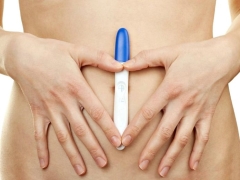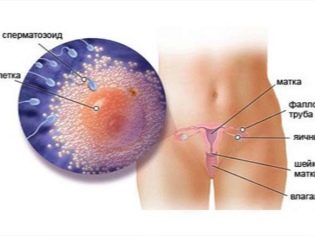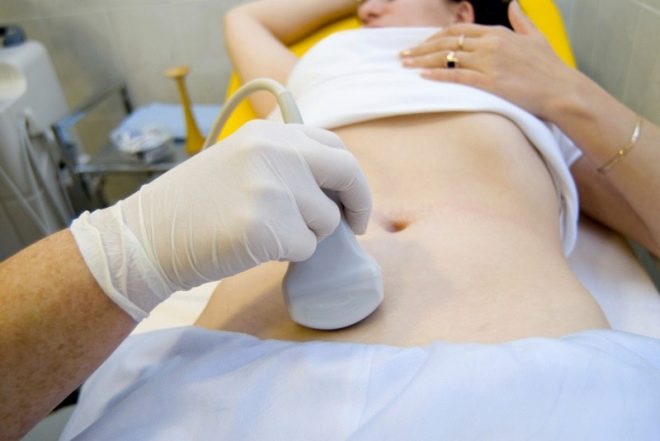Is it possible to get pregnant not on the days of ovulation?
Some women dream of a child and carefully calculate the days favorable for conception, other women try in every possible way to avoid unwanted pregnancy, and do essentially the same thing. And those and others wondering whether it is possible to get pregnant not on the days of ovulation. In this article we will look at this issue in detail.
How does conception happen?
In order to conceive a child, at least two factors are necessary - a mature and fertilized egg and live and mobile spermatozoa, which at the right moment were in the right place.
Spermatozoa males retain their fertile properties on any day of the month, at any time of the year, for most of his life after puberty and until old age. Genital cells of a woman have the ability to fertilize only during the period of ovulation, which lasts 1-2 days per month.
The ovulation period usually falls in the middle of the menstrual cycle. In the first 14 days after the onset of menstruation, the follicle in the ovary is maturing. It is from him on the right day in the ampullary part of the fallopian tube must come a mature egg.
Getting pregnant in the first phase of the cycle is physically impossible, unless, of course, everything is in order with the menstrual cycle and hormonal disruption has not occurred, as a result of which ovulation occurs ahead of time.
On the day of ovulation, a woman is as fertile as possible, as during the day after ovulation, because the egg's life is short - no more than a day. If at this time it does not occur with male gametes, the female reproductive cell dies, descends into the uterine cavity and leaves on the first day of the new cycle along with menstrual bleeding.
However, do not assume that unprotected sex is dangerous from the point of view of the probability of becoming pregnant only on the day of ovulation and a day later. The fact is that male sex cells have greater viability than female oocytes. In favorable conditions of the female body, they can remain active and able to fertilize for 3-4 days. Some sources indicate that certain individuals even survive for 5-6 days.
Thus, sex before ovulation with ejaculation in the genital tract of a woman may well cause pregnancy. Considering the average lifespan of male gametes, it is reasonable to assume that 3-4 days before ovulation and the same after it will be dangerous, adjusted for late ovulation, which was delayed by 1-2 days. In this case, the egg cell that came out of their follicle will meet with sperm cells, which “waited” for several days. Conception is very likely.
There are very rare cases in which conception occurs on days more distant from ovulation. This usually applies to the second half of the menstrual cycle. Rarely, but it happens that in one cycle a woman matures two eggs at once instead of the traditional one.
It is not necessary that ovulation will occur in one day. Even if the first ovulation is not completed by fertilization and the first oocyte is killed, the second egg cell may well be fertilized, which will be released into another fallopian tube later.In this case, an even abnormal menstruation may occur - short and scanty, different from the usual one, but already in the following periods her periods will not come, and the doctor states to the surprised woman that she already has about two months of pregnancy.
Causes of pregnancy on neovulatory days
For a woman to understand her body better, she should know for sure: conception itself can occur only on the day of ovulation and within 24 hours after it. But even if there was no sex at all on the day of ovulation, pregnancy, as we found out, is not excluded if sexual contact without contraception occurred before ovulation or will occur after it.
Pregnancy in this case can occur not only from the sperm that enters the genital tract during ejaculation, but also from the preseminal fluid that is excreted from the man at the time of sexual arousal. Of course, the sperm content in it is much lower, but there are a lot of such unplanned pregnancies in the practice of any obstetrician-gynecologist.
A woman may not realize that many times her menstrual cycle can be changed. The reasons for this are manifold: a change in the climate zone, acclimatization, hormonal disruption, medication and a disease of SARS or influenza, severe stress and chronic fatigue.
Ovulation may be delayed or occur earlier than expected, as a result there may be a situation in which a woman will be confident in the safety of the period and conception will occur.
Advice for planning a pregnancy
To succeed in conceiving a child, you need to accurately determine the period of ovulation. It is these days that sexual intercourse should be the most active. If a woman’s cycle lasts 28 days, then ovulation, according to the calendar method, can be expected on day 14, if the cycle lasts 30 days, ovulation occurs on days 15-16, and so on.
Many women feel ovulation and know its symptoms - a couple of days before the fertile period, the nature of the discharge changes - they become more abundant and burdensome to ensure ease of sexual contact. The acidity of the vagina is reduced so that the spermatozoa have a greater chance of surviving and getting to the egg.
The exact way to know the day of ovulation - ultrasound. Ultrasound examination of the follicles will make it possible to predict the day the oocyte leaves the dominant follicle with an accuracy of one day. Pharmacy tests for ovulation can also help determine the favorable period for conception.
To eliminate the error, doctors recommend that a planning couple engage in unprotected sex from the 10th day of the menstrual cycle every other day. Daily intimate pleasures reduce the quality of sperm, the number of motile and strong gametes in it becomes less. The mode of intimate life after 2 days up to the 16-17 day cycle increases the chances of conception.
It should be noted that a great number of factors influence the fertilization process, therefore the average probability of successful conception from the first time within one cycle does not exceed 7-10%.
Increase the chances will help a healthy lifestyle, taking vitamins partners, psychological comfort and proper nutrition. If the baby does not conceive within a year, it is necessary to consult a doctor and search for the causes of fertility decline or infertility.
Tips for protectable
The calendar method of contraception many women leads to the doctor's office. They want to get rid of an unplanned child. The consequences of abortion can be devastating both for the health of the woman and for her mental state, because the understanding of the depth and seriousness of the committed act sometimes comes much later and stays with the woman for life.
The calendar method in combination with interrupted sexual intercourse is a time bomb that one day will surely “blow”.
Now women can easily choose for themselves another, more reliable method of contraception.To receive oral contraceptives, it is important to consult a doctor, because the independent choice of hormonal drugs may subsequently lead to disruption of the functioning of the ovaries, and the woman can no longer become a mother when she wants.
A fairly reliable method is considered to be barrier contraception - a condom. It does not harm women's health, does not force her to constantly count the days of the menstrual cycle, since a sexual act can be performed on a condom any day. It is only important to make sure that the contraceptive device is not defective, that it is properly worn and correctly removed.
There are women who prefer to use a condom only on “dangerous” days. It is possible to protect oneself this way, but, as already mentioned, no one is insured against the cycle shift, and the “safe”, according to the woman, period may well turn out to be fertile.
Intrauterine devices, caps, hormone injections that protect against pregnancy for a long time, cream and vaginal pills for emergency contraception (15 minutes before sexual intercourse or immediately after it, depending on the drug) - there are a great many options not to fear ovulation days and to wait with horror, whether the next periods will come. The main thing is to consult with the gynecologist, who will help you choose the means that suits you the best way.
But even protected women, it is important to navigate in their own menstrual cycle in order to notice possible pathological changes in time, because a large list of female and common diseases, from which no one is insured, is accompanied by an offset and abnormal cycle.
The fact that you can get pregnant after menstruation, will tell the gynecologist in the video below.





























